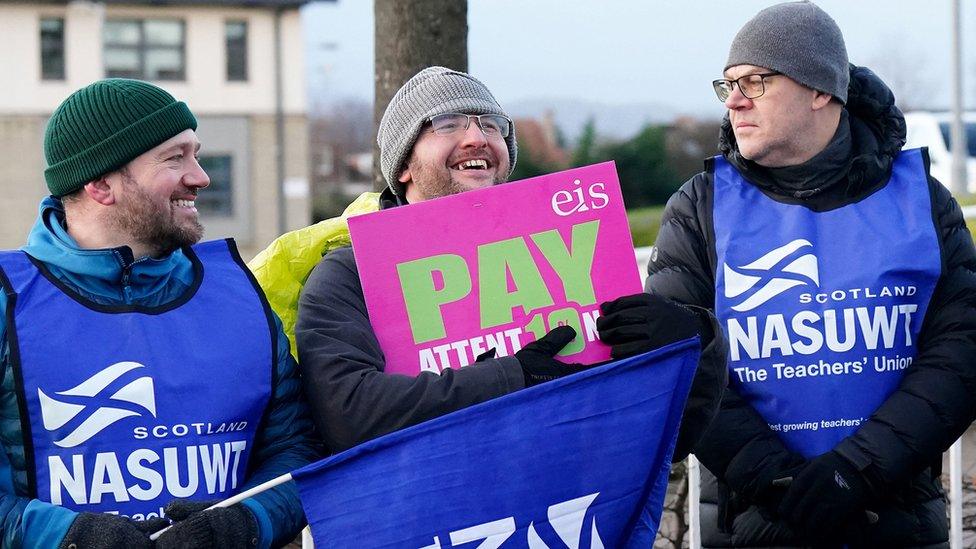Members of NASUWT teaching union narrowly accept pay offer
- Published

The NASUWT said many of its members were unhappy with the offer
Members of the NASUWT teaching union have narrowly voted to accept a pay offer after a long-running dispute.
Their decision means there is now no possibility of further strike action in Scottish schools.
The NASUWT said its members voted by 52% to 48% to back the offer, which it described as "not good enough".
The union added that it would remain in dispute with councils and the Scottish government - but had no further industrial action planned at present.
The NASUWT is due to meet Education Secretary Shirley-Anne Somerville on Wednesday.
The union said it would make it clear that a substantial number of its members were still unhappy with the pay offer.
Members of the EIS, which represents about 80% of teachers, and the SSTA had already overwhelmingly backed the deal.
Teachers will receive a 7% pay rise backdated to last April, a further 5% next month and 2% in January.
The Scottish government has described the deal as "fair, affordable and sustainable".


The teachers' pay strike is now over.
Many members of the NASUWT remain unhappy about pay but there is no prospect of further strikes over the 2022 and 2023 pay rises.
The narrow margin of acceptance by the NASUWT contrasts with the overwhelming decisions made by members of the two other classroom unions - the EIS, which is by far the biggest union in Scottish education, and the SSTA.
However, the underlying issue for all the unions remains that the pay offer was still below inflation. The EIS urged its membership to accept the offer on the basis that it was the best which could realistically be achieved at present.
Even if inflation falls significantly, it would be a surprise if the teachers' unions do not make a substantial claim for the first rise not covered by the deal which is due in August 2024. The unions still want to restore the value of teachers' salaries.

The NASUWT said 46% of members who responded to the ballot said they disagreed with or were angry about the latest offer, while 39% said they were disappointed with the offer but believed that it was necessary in the circumstances.
A further 13% said they agreed with the offer.
The union said 47% were concerned the pay proposal would have a negative impact on teacher morale, compared with 16% who said it would have a positive impact.
General secretary Dr Patrick Roach said: "It is clear that our members are fed up with being taken for granted, with the interminable delays and with the secretive way in which the Scottish government and the employers have acted.
"Teachers have endured more than a decade of cuts to their pay alongside rising levels of workload and worsening working conditions which still need to be addressed."

The EIS union has ended its industrial dispute with employers
The EIS, SSTA and NASUWT teaching unions have been involved in a year-long industrial dispute with local authorities
The deadlock was broken last week when councils, using extra money from the Scottish government, made a fresh offer that would see most teachers' salaries rise by £5,200 in April.
The EIS paused targeted strikes that were being held in constituencies of senior politicians including First Minister Nicola Sturgeon and Deputy First Minister John Swinney.
Members of the SSTA and EIS voted overwhelmingly to accept the deal last week.
Education Secretary Shirley-Anne Somerville said: "This decision means that the threat of further strike action in our schools is now formally lifted, which is great news for our children and young people, particularly those who are preparing for exams in the spring.
"Teachers will receive their backdated salary increase as soon as possible, which I am sure will be very welcome."